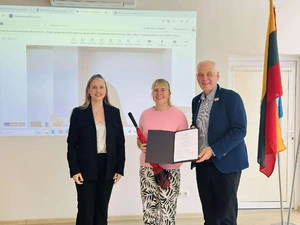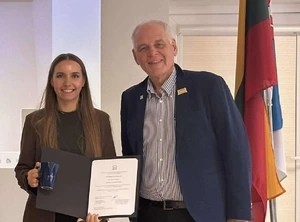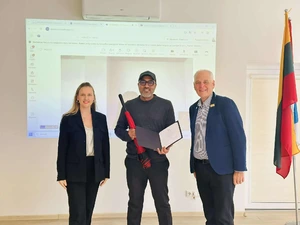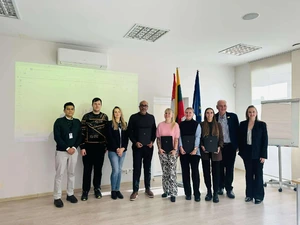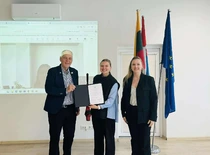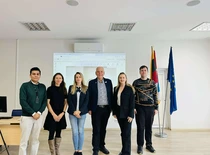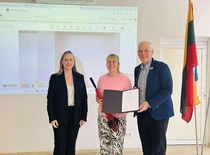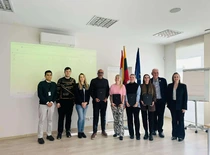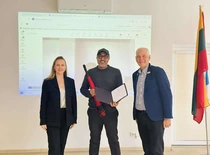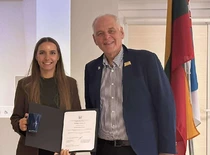For the second consecutive year, Lithuanian researchers joined the InSPiR2eS Global Pitching Research Competition (IGPRC). This international initiative empowers early-career academics to communicate their research ideas with clarity and purpose.
What began as a small event at Kaunas University of Technology (KTU) has grown into a national platform for collaboration and inspiration. This year, the competition gathered young researchers and doctoral students from six Lithuanian institutions and a wide variety of fields – from physics and chemistry to economics, marketing and psychology.
The Lithuanian round of IGPRC 2025 built on last year’s success, evolving from a university-hosted seminar into a national event with a shared goal: to improve how researchers tell the story of their science. Participants were challenged to present their work using the Pitching Research Framework – a simple but powerful structure designed by Professor Robert Faff to help academics express the “what, why and how” of their research in just a few minutes. The atmosphere at KTU’s School of Economics and Business was both competitive and collaborative, with participants learning not only to pitch their ideas but also to listen, connect, and build bridges across disciplines.
At its heart, IGPRC reflects a shift that many universities are now embracing – research communication as a core academic skill. By focusing on storytelling, clarity, and purpose, the competition helps young scholars move beyond jargon and complexity, allowing their ideas to resonate with both academic and wider audiences.
Four winners to represent Lithuania on the global stage
Each winner brought a unique perspective to the competition. Gabrielė Bumbulytė Žukevičienė presented research on how food and beverage industry by-products can be transformed into high-value protein and biofertilizers, offering a sustainable model for the circular bioeconomy. Justina Jaseliūnaitė impressed the judges with her study of microchannel vortices and their role in improving cooling systems – a technical topic explained in a way that anyone could follow. Syed Muntazir Mehdi examined the delicate balance between efficiency and cognitive agency in AI-driven customer interactions, reflecting on how technology influences human decision-making. Meanwhile, Roberta Spangelytė focused on enzyme-assisted extraction and fermentation of underutilised plants to improve women’s nutrition, showing how science can directly impact health and wellbeing.
All four winners will compete with peers from around the world for a share of the AUD 20,000 prize pool. But beyond the financial reward, most participants see the experience itself as the real prize – an opportunity to gain confidence, receive constructive feedback, and see their work through a global lens.
From framework to movement: the InSPiR2eS network
Behind the competition stands Professor Robert Faff, a renowned academic and founder of the InSPiR2eS network. His Pitching Research Framework has become a global tool for academics who want to refine how they communicate their ideas. The framework encourages researchers to focus on the essence of their work – identifying the problem, explaining the approach, and highlighting why it matters.
Faff’s collaboration with Lithuanian institutions, particularly with KTU, has played a significant role in building local capacity for effective research communication. Through workshops, mentorship, and international networking, he has helped doctoral students and early-career researchers gain a new appreciation for the human side of science – its stories, questions, and societal impact. The growing involvement of Lithuanian universities signals that this approach is taking root, gradually transforming the way researchers prepare, present, and promote their ideas.
A culture of clarity and connection
The Lithuanian round of IGPRC was organised by Assoc. Prof. Neringa Gerulaitienė from KTU’s School of Economics and Business, who also serves as Lithuania’s country node leader for the InSPiR2eS network. For her, the competition is more than just an event – it is part of a broader effort to nurture a culture of open and confident research communication in Lithuania.
The jury, which included Professor Faff alongside Dr Rūta Ubarevičienė, Ernestas Uzdila, Dr Ieva Barauskienė, Dr Farrukh Naseem Qureshi, Dr Meda Andrijauskienė and Dr Eglė Butkevičiūtė, praised the participants’ enthusiasm and diversity. “It’s wonderful to see young researchers engaging in high-quality science communication and sharing their work across fields and institutions,” said Dr Ubarevičienė, Chair of the Young Academy of the Lithuanian Academy of Sciences. “Such initiatives fill an important gap in Lithuania’s research culture, and I hope this becomes a lasting tradition.”
Assoc. Prof. Gerulaitienė echoed this sentiment: “We are incredibly proud of all participants and the progress we see in developing research communication skills across Lithuania. I do not doubt that our finalists will represent Lithuania with excellence on the global stage and continue to inspire other young researchers to share their ideas with confidence.”


